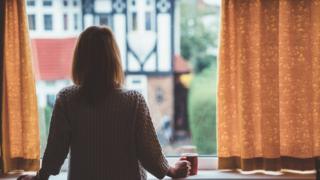Coronavirus self-isolation: What's it like to be on your own?
 Image copyright
Getty Images
Image copyright
Getty Images
It is 20 years since I had to self-isolate.
It had nothing to do with coronavirus. For 10 years, I had wrestled with an overactive thyroid.
Radioiodine is a common treatment for thyroid conditions. It was the best course for me, even if the risks of exposing others to radiation seemed frightening.
Plus, as a busy mother to a small ball of energy - a non-sleeping four-year-old boy - the idea of giving up the hectic whirl of work and childcare had its positives.
So I'd be radioactive - but imagine whole cups of coffee and piles of newspapers to get through uninterrupted?
Who's for visiting the toilet on your own without a child's rap on the door or not having to get up to answer a cry in the night?
What's not to like?
On a warm Friday in early June 2000, I drove alone to the hospital. I was advised against having anyone in the car with me when I was driving back radioactive and - I imagined - glowing like a lava lamp.
I was apprehensive.
At the hospital, I waited on my own in a little room for the doctor to bring the single capsule dose.
You cannot physically touch the capsule. It comes in a long glass cylinder.
I felt very alone, putting the cylinder to my lips.
I glugged it down. I was officially radioactive and self-isolating.
Our own Upstairs, Downstairs
At home, we had prepared to bunker down.
Our small child had been delivered to my sister for the weekend to ensure he would not suffer from radiation exposure.
It would be a couple of weeks until I saw him again. I had never been away from him for more than a single night.
I left him a box of little surprises - puzzles and games and furry animals and a touchstone to hold when he missed me. But it was me already doing the missing.
That weekend, our house became an old episode of Upstairs, Downstairs.
My husband was Hudson the butler - "him below stairs".
I was Lady Muck in residence in our bedroom. I had my own bathroom and my own cups, glasses, plates and eating utensils.
What do I need to know about the coronavirus?
He had a separate bedroom downstairs and used a separate toilet.
He left trays of food at my bedroom door. He bought me newspapers. He gave me a little bell to ring for when I needed something urgently.
When I got lonely, I shouted down the stairs and he shouted back up.
I saw no-one but the top of husband's head downstairs for three whole days.
These were the days before mobile phones, Skype, Facebook, Netflix and iPads. Alone meant minus all but a landline.
I washed and flushed the toilet twice. I washed my hands. I washed them again. The hours ticked by. The joy of uninterrupted coffees and newspapers wore off.
I had signed up to mark 500 GCSE English language papers to pass the hours and to keep me from imagining how my kidneys might glow in the dark, like the stars we stuck to our son's bedroom ceiling.
It was a lost weekend.
Moving back in with Mum
On the Monday, I got into the car and drove the 30 miles to my mother's home.
The guidelines suggest at least a week away from children and we figured two might be best.
I rolled into my childhood trundle bed, marvelled at how my feet stuck out the end and let my mother take over where my husband left off.
The rule is to keep a distance of 3ft from women who are pregnant and children under 18 years old but, essentially, I stayed away from people because you never know who might be pregnant.
My mother was a star. I had left home 20 years earlier and she had had a whole two decades to live minus me. The honeymoon period was short.
As the days passed, I could spend a little more time with her. Perhaps this was not so very wonderful.
We were the Odd Couple. We shot each other lightning glances. We huffed - it's a family trick.
I waited until she went out then tidied up, moved her books and papers into tidy piles, cleared her away.
She returned and fixed a beady eye on me. All picture, no sound.
A kindness
I wanted my life back. I missed my family. There was no Skype or Facetime to see my son's face. I felt profoundly alone.
Then, all of a sudden, time was up - it was over.
Self-isolation? It was no picnic but it passed.
If you ask me what I remember most about that time, it was not the lonely space in our big double bed or double flushing the toilet or the plonk of a tea tray at the door signalling dinner for one.
No, it was the kind doctor who came bearing the radioiodine capsule in the glass tube.
"I'll sit with you and hold your hand while you take it," he said.
And he did and I took it.
At that moment, his was a kindness that meant the world.